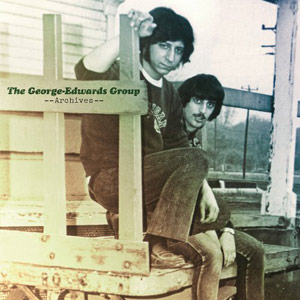
Archives
Drag City
Much like the mysterious history of lauded cult figure Bobb Trimble (who we reviewed a few weeks back), the career arc of The George-Edwards Group will probably never be an open and shut case. The Motor City duo of Raymond George and Edward Sarkis Balian formed in the early ’70s in relatively obscure hard rock circles, but soon retreated to the luxury of a studio where the two would toil away for the rest of the decade, creating 38:38, which finally saw limited release in 1977. It’s a record often touted as one of the private press era’s essential albums and a favorite of The Acid Archives. Any fan of outsider psych-pop and loner folk should no doubt be familiar with the shadowy, labyrinthine genius of 38:38, especially in the wake of Drag City’s 2007 reissue. And anyone entranced by the downer void of that record would consider it an anomaly completely in a world of its own and completely opposed to prog excess, punk and new wave trends, and the dinosaur AOR tracks littering FM radio (even if at times it subleases traits from all of those).
But the story—and the music, for that matter—didn’t end there, and 38:38 was not a fluke. Seeing the demand for their wares after the reissue, George and Balian took it upon themselves to let Drag City into their Pandora’s box of recordings that dated from between 1977 and sometime in the mid-80s (the question still remains as to when the duo actually stopped), slowly sending various tracks and vintage pictures from their time in their fabled studio. Eventually, the material added up, not exactly to a fully-formed or intentional album from the duo, but enough to warrant this release.
With Archives, 38:38 is not a prerequisite. In fact, one could suggest that Archives is a better place to start with The George-Edwards Group, as these are in no way outtakes and in many ways better represent the whimsy concocted over the span of their existence. With frequent interludes hinting at new age (“Himalayan Adventure Pt. 2”) and frivolous baroque-pop (“Walrus Waltz”), it could be thought that these are odds and sods cobbled together, but most of the songs on Archives are indicative of the duo’s haunting autumnal hues veering between acoustic madrigals culled from Middle Earth (“Shattered Heart”) and acid-drenched synth-dirges transmitted from deep space (“The Blowing Wind”). Though bands of the time such as Pink Floyd and the Moody Blues are obvious touchstones for the duo’s musical language (especially their penchant for grand studio productions), Archives still registers as an extraterrestrial relic, spoken in unknown tongues and reinterpreting everything from Sgt. Pepper’s residual echo to the soft-rock creamery of 10cc. As strange as Archives is, it inevitably works as a whole, if only because the album’s anchors, the piano-led melancholy of “It’s All Right” and the existential drifter folk of “Nevada,” become increasingly lodged into one’s consciousness as timeless pieces of memory thought lost. Though 38:38 may be regarded as the duo’s one true masterpiece, Archives is The George-Edwards Group taking a giant step out of the shadows of obscurity and into a place where they should no longer be relegated as mere footnotes among the annals of psych curios.
Kevin J. Elliott
PAST PERFECTS
Patti Smith, Outside Society
Bobb Trimble, Crippled Dog Band
Iggy Pop, Roadkill Rising... The Bootleg Collection 1977-2009
Archers of Loaf, Icky Mettle
Culture, Two Sevens Clash
The 3Ds, Early Recordings 1989-90
Stone Coal White, Stone Coal White
Father's Children, Who's Gonna Save the World
Paul McCartney, McCartney and McCartney II
Peter Tosh, Legalize It and Equal Rights
Sebadoh, Bakesale
Love, Black Beauty
Reatards, Teenage Hate
DOA, Something Better Change and Hardcore 81
